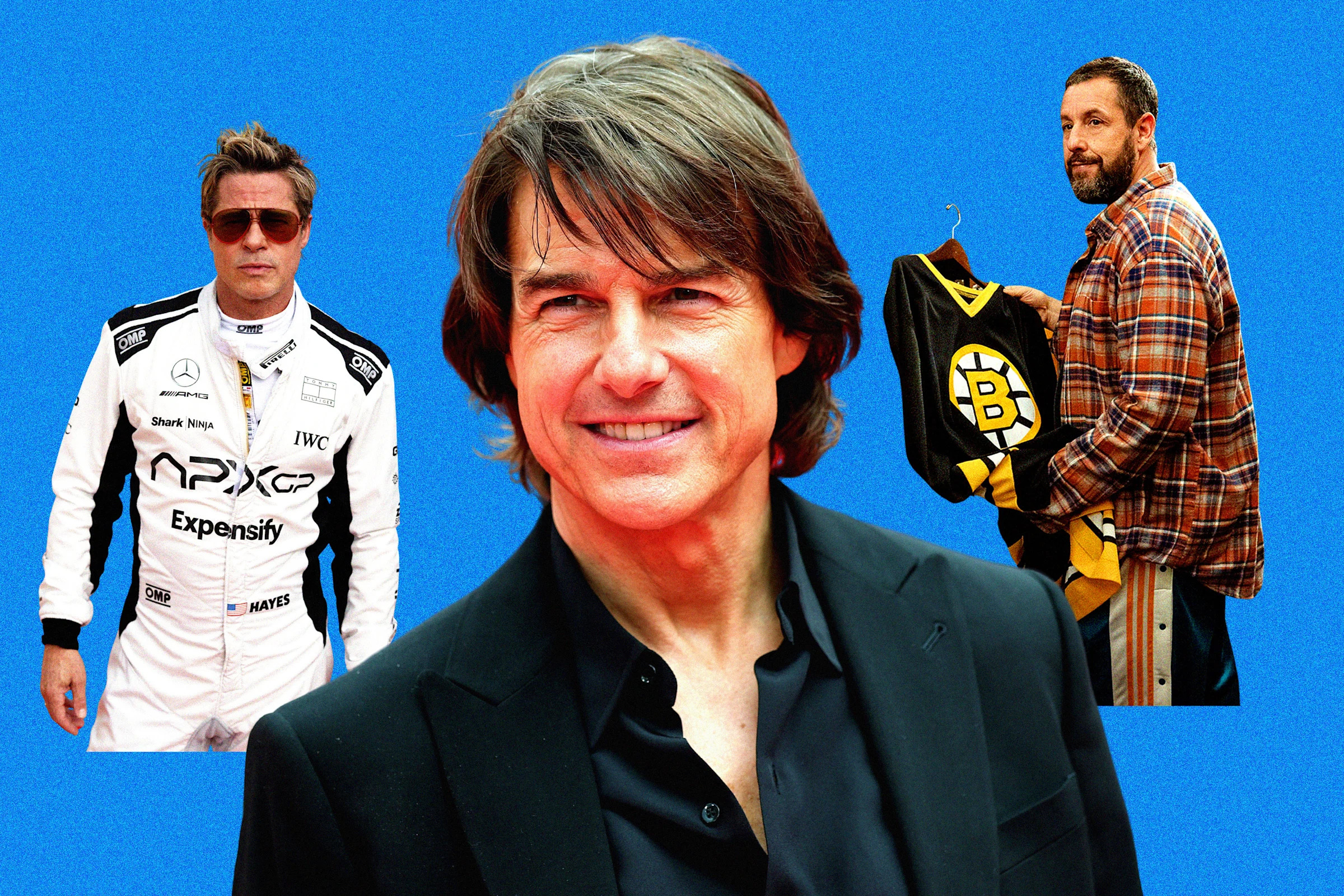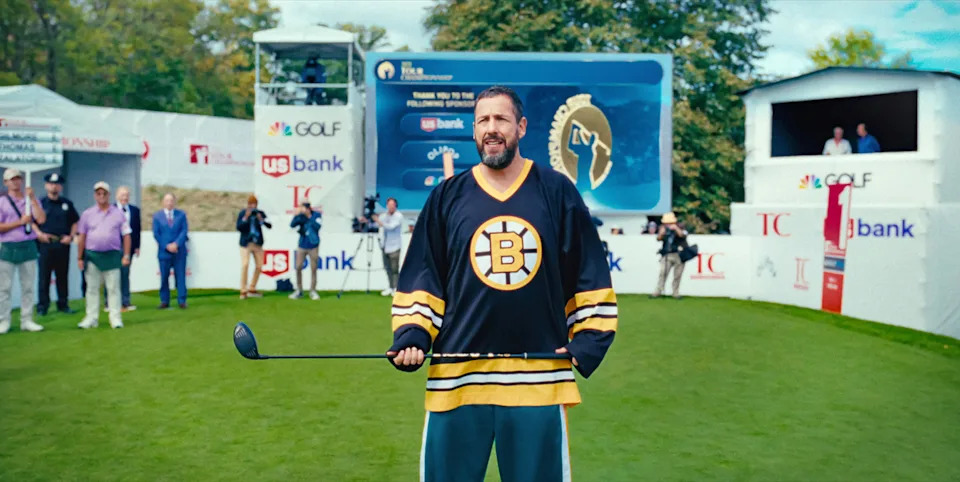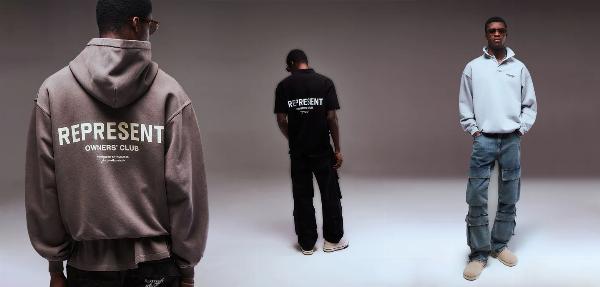The undeniable appeal of the ‘trust me’ movie

There’s a guy. He’s really good at what he does, but his methods are a bit unconventional. So unconventional, in fact, that he’s a bit notorious and hesitant to return to his career, where his peers and bosses find him dangerous and irritating. But things are getting pretty bad, so he has to make a triumphant return, breaking a few rules in his quest to save the day.
You’ll just have to trust him.
This is the plot of at least three movies that premiered this summer: Mission: Impossible — The Final Reckoning, F1: The Movieand Happy Gilmore 2. They’re all ultra-successful hits led by beloved movie stars — a dying breed who don’t sign on to just any project. The “trust me” trope has proven to be so successful, it’s no wonder they’re fueling the box office and streaming charts.
AdvertisementAdvertisement#_R_193ckr8lb2mav5ubsddbH1_ iframe AdvertisementAdvertisement#_R_293ckr8lb2mav5ubsddbH1_ iframe“I need you to trust me one last time,” Tom Cruise’s stubbornly capable secret agent character says in Mission: Impossible — The Final Reckoning. He proceeds to push the laws of physics and defy the typical constraints of the human body — never mind that Cruise is in his 60s and does his own stunts — frustrating those around him, but saving the world.
 Tom Cruise hangs from a real-life airplane in Mission: Impossible — The Final Reckoning. (Paramount Pictures/Courtesy Everett Collection)
Tom Cruise hangs from a real-life airplane in Mission: Impossible — The Final Reckoning. (Paramount Pictures/Courtesy Everett Collection)The appeal of the “trust me” trope goes back to our psychological need in stories and in real life to feel secure, Alex Beene, a professor at the University of Tennessee at Martin, tells Yahoo. We like seeing this sort of thing played out onscreen over and over again because it’s one of our most basic desires.
“As much as men and women claim to love independence in most aspects of their lives, there's a sense of relief and assuredness in letting someone else solve problems and overcome challenges,” he says. “As a member of the audience, it's even more appealing because it makes you feel [that] all because of one person or group, everything ultimately will be OK.”
‘Belly fat and bad knees be damed’
The fact that the fictional heroes we’re often comforted by are tough, experienced men appeals greatly to other people like them. Adults over 45 are the demographic least likely to go to the movies, according to a Yahoo News/YouGov Survey conducted in May 2025, so it makes sense that studios may craft narratives and cast actors specifically to break into that market.
AdvertisementAdvertisement#_R_1b3ckr8lb2mav5ubsddbH1_ iframe AdvertisementAdvertisement#_R_2b3ckr8lb2mav5ubsddbH1_ iframe“For older men, [a “trust me” story] offers the promise that they, too, could pull it all together to save themselves or their families or the world if push came to shove, belly fat and bad knees be damned,” Tim Stevens, a writer at Connecticut College, tells Yahoo.
Younger demographics may see a bit of their own dads in those characters. Though Cruise’s character isn’t a father, he has a fatherly relationship with several of his younger teammates, leading and protecting them even at his own expense. Christopher McKittrick, the former editor of Creative Screenwriting magazine, tells Yahoo that "grizzled old gunslinger" stories have been popular since classic Western films first took off. They appeal to dads in particular because they love seeing someone truly talented and experienced share their knowledge with young people, who then trust them and take their advice.
It helps that the stars of these movies are actually veterans of their own industries, too.
“Men can identify with aging movie stars like … Cruise and Pitt based on their personas of keeping a cool head under fire, utilizing their unique expertise to solve a critical problem, and, of course, teaching those young people what they don’t know,” McKittrick says. “Taking dad to see a crowd-pleasing movie like this can make for an easy family outing and is an easy way for kids to connect with dad's interests.”
 Damson Idris and Brad Pitt in F1: The Movie. (Warner Bros./Courtesy Everett Collection)
Damson Idris and Brad Pitt in F1: The Movie. (Warner Bros./Courtesy Everett Collection)It’s nice to see an older guy come out on top. It may happen all the time in the movies now, but that’s not typically the case in sports or other real-life, action-packed scenarios. In F1: The Movie, Brad Pitt plays a talented but rough-around-the-edges driver who returns to Formula 1 racing years after a horrific crash, only to use strategic aggressive driving and crashing to help his team defeat the competition. He defies the expectations of his younger teammate, but instead of shoving it in his face, he teaches the rising star a thing or two. Dads love this, but so do audiences at large: F1: The Movie has made more than $500 million at the global box office, becoming both Pitt and production company Apple’s biggest blockbuster.
AdvertisementAdvertisement#_R_1crckr8lb2mav5ubsddbH1_ iframe AdvertisementAdvertisement#_R_2crckr8lb2mav5ubsddbH1_ iframeTo Stevens, “trust me” movies all share a similar goal: to fulfill “the promise that it is never too late for you to make a difference, [that] your heroes are still the people they were when you first looked up to them and [that] there are people out there in the world motivated by more than greed, arrogance and cynicism.”
I need a hero
Though the sheen of pure masculinity is what may initially draw people into these action movies and comedies, there’s an inherent vulnerability in these stories. Returning to the careers they’ve left, even if the goal is to save the day, requires vulnerability.
The way this subverts our expectations and reverses typical power dynamics “makes a self-reliant hero irresistibly human and relatable,” Ali Shehata, a physician and founder of production company FamCinema, tells Yahoo. The fact that our protagonists are begging for trust “one last time” adds an element of scarcity, resulting in a situation that is “truly epic,” he says.
 Adam Sandler in Happy Gilmore 2. (Netflix/Courtesy Everett Collection)
Adam Sandler in Happy Gilmore 2. (Netflix/Courtesy Everett Collection)Even Happy Gilmore, a golfer whose violently powerful swing infuriated his peers and made him a legend, goes to a place of deep vulnerability in Happy Gilmore 2. Twenty-nine years after the original film, he returns to golf to earn money for his daughter’s education. Though his character oozes humor and aggression, the sequel pushes him — and us — to emotional places. Viewers are buying into it as well — it had the biggest weekend debut ever for a Netflix film with 46 million views in just three days.
AdvertisementAdvertisement#_R_1ejckr8lb2mav5ubsddbH1_ iframe AdvertisementAdvertisement#_R_2ejckr8lb2mav5ubsddbH1_ iframe“It gives us that exhilarating feeling of being part of something bigger than ourselves, while also creating suspense about whether that precious trust we lend to our hero, whom we have faithfully followed for so many previous adventures, will finally be vindicated,” Shehata says.
It’s satisfying to see them succeed as their enemies and critics fail, delivering a happy ending through action-packed events, unconventional twists and emotionally vulnerable moments. It’s no wonder it’s the go-to formula for a box office hit this summer.














